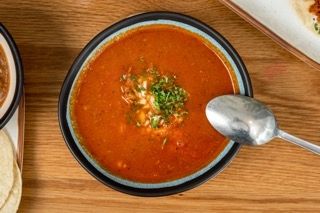Enjoy authentic freshly made guacamole during happy hour
Is Mexican Food Healthy? Unloading the Nutritional Benefits of Standard Active Ingredients
The concern of whether Mexican food is healthy and balanced invites an exploration of its standard active ingredients. Beans and corn function as fundamental staples, rich in protein and fiber. Avocados give advantageous fats, while various natural herbs and flavors include flavor and health and wellness advantages - freshly made guacamole. Together, these components develop a tapestry of nutrition. The healthiness of Mexican food often depends on preparation techniques and part sizes. What function do these variables play in determining its total dietary worth?
The Power of Beans: Healthy Protein and Fiber-Rich Staples
Although typically forgotten, beans act as a keystone of Mexican food, supplying a wealth of nutritional advantages. Rich in healthy protein, they are an exceptional plant-based option for those looking for to meet their dietary healthy protein requires. This high healthy protein material sustains muscular tissue repair service and development, making beans important for both vegetarians and meat-eaters alike. In addition, beans are a phenomenal source of nutritional fiber, which assists in digestion and promotes a feeling of volume, potentially aiding with weight management.
The variety of beans utilized in Mexican meals, such as black beans, pinto beans, and kidney beans, contributes to a diverse taste profile and can improve meals nutritionally. In addition, beans are low in fat and include crucial nutrients, including folate, iron, and magnesium. With each other, these characteristics make beans a vital component, supplying both nutrients and food in conventional Mexican price.

Corn: a Versatile Grain With Nutritional Perks
Corn attracts attention as a versatile grain essential to Mexican cuisine, celebrated not only for its culinary applications yet likewise for its remarkable dietary profile. As a primary component in recipes like tortillas, tamales, and pozole, corn provides vital nutrients that add to a balanced diet plan. Rich in carbs, it functions as a considerable energy resource, while likewise being low in fat, making it a desirable choice for numerous dietary requirements.
Corn is an excellent resource of nutritional fiber, which assists in digestion and promotes satiety. It has significant quantities of vitamins such as B-complex vitamins, which are vital for basal metabolism. The existence of anti-oxidants, especially carotenoids, adds to total health and wellness by decreasing oxidative stress and anxiety. Furthermore, corn is gluten-free, accommodating those with gluten sensitivities. In general, the dietary benefits of corn emphasize its importance in standard Mexican food and its duty in a healthy diet.
Avocados: Healthy And Balanced Fats and Nutrients in Every Bite
Avocados play a considerable duty in Mexican food, complementing dishes with their velvety appearance and rich flavor. Past their cooking appeal, avocados are celebrated for their excellent dietary profile. They are an abundant source of healthy monounsaturated fats, which can assist reduced bad cholesterol levels and assistance heart wellness. Furthermore, avocados are loaded with important minerals and vitamins, including potassium, vitamin E, and B vitamins, adding to total wellness.
The high fiber content in avocados help food digestion and advertises satiation, making them a useful addition to any type of meal. Their distinct nutrient make-up can also support skin health and offer anti-inflammatory benefits. Integrating avocados into traditional Mexican recipes or appreciating them as a standalone snack can enhance both taste and nutrition, showing why they are a cherished staple in Mexican food. Generally, avocados provide a scrumptious method to appreciate healthy and click for source balanced fats and essential nutrients in every bite.

Natural Herbs and seasonings: Flavorful Health Boosters
While delighting in the abundant tastes of Mexican food, one can not overlook the crucial role that spices and herbs play in boosting both preference and health. Ingredients such as chili, cilantro, and oregano peppers not only add to the vivid taste profile but also offer significant health and wellness benefits. Cilantro is known for its cleansing homes, helping to remove heavy metals from the body, while oregano is loaded with antioxidants and possesses anti-inflammatory effects.
Chili peppers, a staple in numerous Mexican meals, include capsaicin, which has been linked to boosted metabolic rate and discomfort relief. Furthermore, spices like cumin and coriander support food digestion and might help in blood sugar regulation. Integrating these tasty health boosters into dishes not just improves the culinary experience yet likewise advertises general well-being, making Mexican food not simply delicious, yet likewise nutritionally helpful.
Conventional Cooking Methods: Enhancing Nourishment and Taste
Traditional food preparation techniques in Mexican food play an important duty in improving both nutrition and taste, as they typically prioritize classic techniques and fresh active ingredients. Strategies such as nixtamalization, where corn is soaked and cooked in an alkaline solution, not just enhance the nutrient account of tortillas however also improve their digestibility - take out and delivery. Furthermore, click resources using sluggish food preparation techniques, like stewing or braising, permits flavors to blend wonderfully while preserving the stability of the active ingredients

Often Asked Concerns
Are Mexican Food Portions Normally Larger Than Other Foods?
Mexican food parts are frequently bigger than those of numerous various other cuisines. This particular shows conventional eating methods, stressing common sharing and hearty dishes, which can result in an extra significant serving dimension in general.
Just how Does the Preparation Approach Affect Healthiness of Mexican Food?
Prep you could look here work techniques significantly influence the healthfulness of Mexican food. Techniques such as cooking or steaming protect nutrients, while frying can raise undesirable fat web content. Selections of ingredients and cooking designs ultimately figure out total nutritional worth.
Can Mexican Food Be Customized for Specific Dietary Constraints?
Mexican food can undoubtedly be customized for specific dietary constraints. Substitutions, such as utilizing corn tortillas for gluten-free diet regimens or incorporating more veggies, enable people to take pleasure in typical flavors while suiting various nutritional requirements.
What Are Usual Mistaken Beliefs Concerning Mexican Food and Health?
Common mistaken beliefs concerning Mexican food consist of the idea that it is naturally unhealthy, overly spicy, and only concentrated on fats. In truth, conventional meals usually include nourishing active ingredients and can be customized to different nutritional requirements.
Exist Healthier Choices at Mexican Restaurants?
Healthier choices at Mexican restaurants typically include grilled meats, beans, and fresh vegetables. Picking recipes that stress entire components and preventing heavy sauces can cause an extra healthy eating experience, advertising general well-being.
The range of beans utilized in Mexican dishes, such as black beans, pinto beans, and kidney beans, contributes to a varied taste profile and can enhance meals nutritionally. Avocados play a significant function in Mexican cuisine, complementing dishes with their luscious structure and rich flavor. Including avocados right into typical Mexican dishes or appreciating them as a standalone snack can enhance both taste and nutrition, demonstrating why they are a precious staple in Mexican food. While taking pleasure in the abundant flavors of Mexican cuisine, one can not forget the crucial function that spices and herbs play in boosting both taste and health. Conventional cooking approaches in Mexican cuisine play an essential duty in improving both nourishment and flavor, as they often focus on fresh ingredients and classic techniques.